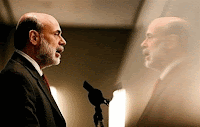 By Louis Uchitelle and Michael M. Grynbaum
By Louis Uchitelle and Michael M. Grynbaum International Herald Tribune
NEW YORK: With jobs leaking from the U.S. economy month after month, the Federal Reserve's policy makers decided on Tuesday to keep the benchmark short-term interest rate they control at 2 percent, a historically low level.
"Although downside risks to growth remain," the Fed said, "the upside risks to inflation are also of significant concern to the committee."
The Fed is grappling with an economy that remains weak even though prices have been rising at a fast pace. That has made it difficult for U.S. central bankers to cut rates further to spur growth because to do so might worsen inflation. But it has also limited their ability to raise borrowing costs because it would risk damaging the still shaky financial system.
"Labor markets have softened further and financial markets remain under considerable stress," the Fed said. "Tight credit conditions, the ongoing housing contraction, and elevated energy prices are likely to weigh on economic growth over the next few quarters."
Some of the pressures on the economy and policy makers may be easing, though. On Tuesday, oil prices dropped to a three-month low, fanning optimism that the rise in commodities may be relenting, sending stocks to a red-hot rally. And a report on activity among service-oriented businesses showed a better-than-expected reading in July. In late trading, the Standard & Poor's 500 was up nearly 2 percent, while the Dow Jones industrial average rose 2 percent at 11,522.
The gains were led by stocks that have performed poorly this year: financial firms and companies dependent on free-spending consumers. Investors were cheered by the steep drop in crude oil, which fell as low as $118 before climbing back slightly. Before noon, oil was trading at $119.55 a barrel on the New York Mercantile Exchange.
Analysts pointed to weather forecasts predicting that the tropical storm hitting the coast of Texas would bypass major drilling platforms and refineries. That would mean no serious disruptions to domestic oil supplies, which some had initially feared.
There is also a broader sense among investors that the slowdown in economic growth will curb fuel demand around the world, pulling prices back to more reasonable levels. Oil prices have fallen about 17 percent in three weeks.
At the Fed, a majority of policy makers, including Ben Bernanke, the chairman, have argued for much of the past 12 months that the greatest danger to the economy is not inflation, but the damage from falling home prices, the credit crisis, shrinking employment and stagnant wages. To help overcome those weaknesses, the Fed cut interest rates at every meeting since last September - and sometimes even between meetings to deal with the financial crisis.
Investors were cheered by the idea that the Fed, like other central banks, now seems less likely to raise interest rates. European stocks soared even higher than Wall Street: Most European benchmark indexes were up 2 percent to 3 percent. In London, the FTSE 100 index rose 2.5 percent.
Earlier on Tuesday, the Institute for Supply Management, a trade group of U.S. purchasing executives, reported that activity among service-oriented businesses in July contracted but was better than expected.
No comments:
Post a Comment